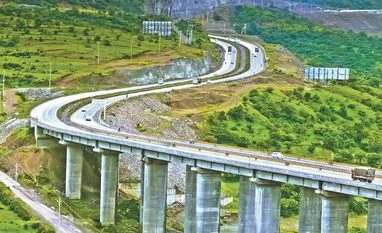This equity investment would be leveraged to raise close to Rs 50,000-crore debt.
The total project cost is approximately Rs 70,000 crore and the entire construction risk would be borne by the National Highways Authority of India (NHAI). This arrangement essentially means that the ownership of the project that is planned along the lines of new alignments would be with the NIIF.
It is learnt that foreign sovereign funds are willing to co-invest with the NIIF in road projects. At present, Abu Dhabi Investment Authority (ADIA) is a partner with NIIF, which was formed by the Indian government as a private entity.
The Union ministry of road transport and highways would have to seek Cabinet approval for the arrangement. Details like toll collection on the expressway and to whom the proceeds would go to are still being worked out.
The NHAI signed a memorandum of understanding with NIIF for the investment on Monday.
The proposed Delhi-Mumbai expressway would also be connected to the industrial city of Indore and an arm of the erstwhile Golden Quadrilateral.
The partnership would be through formation of a special purpose vehicle. The model would be a funding arrangement for other large-sized road projects, to be executed by NHAI in future.
Union road minister Nitin Gadkari said, “NHAI is raising finances for its mega projects, and is not dependent only upon budgetary support. Several funding models were adopted in the past towards this, which have yielded good results.”
This arrangement of innovative alternative sources of funding is being looked into by NHAI to attract international investors and fund houses that are willing to invest in road projects in India. But they are not very keen on taking risk related to the project execution.
This arrangement is expected to bring huge investments at economical rates for highway development in India and reduce the stress of borrowing on the NHAI balance sheet.
Gadkari also said the NIIF mode would provide innovative financial framework for other projects, including the 24,000 km Bharatmala Pariyojana costing around Rs 7.5-trillion.
The first investment agreement between NIIF and a wholly-owned subsidiary of ADIA for $1 billion fund infusion was signed in October 2017.
NIIF would eventually have a corpus of $6 billion (Rs 40,000 crore) but the government’s share in it would be less than 50 per cent in order to keep the ownership non-government.
An India-UK Green Growth Equity Fund (GGEF) has also been set up under one of the verticals of NIIF. It has anchor commitments of £120 million each from the Centre (through NIIF) and the British government. Funds through it would be channelised for green energy projects.
NIIF is likely to see more equity participation from strategic partners, like overseas sovereign, quasi-sovereign, multilateral and bilateral investors. ADIA, for instance, is an investor in the Master Fund and a shareholder in NIIF’s investment management company.
NIIF was incorporated as a company and an initial budgetary allocation of Rs 4,000 crore was made for 2016-17 but the funding remained unutilised.
In July 2015, the Union Cabinet decided to set up one or more alternative investment funds or AIFs under the Securities and Exchange Board of India (Sebi) regulations.
The government had initially planned to get NIIF as an investor in the transfer-operate-transfer (TOT) project. NIIF was to back players that would bid for operation and maintenance of these projects. None of the TOT packages bid so far has NIIF as an investor.
In August 2016, the Cabinet Committee on Economic Affairs had approved monetisation of highway projects that are operational and generating revenue for at least two years.
To read the full story, Subscribe Now at just Rs 249 a month
Already a subscriber? Log in
Subscribe To BS Premium
₹249
Renews automatically
₹1699₹1999
Opt for auto renewal and save Rs. 300 Renews automatically
₹1999
What you get on BS Premium?
-
Unlock 30+ premium stories daily hand-picked by our editors, across devices on browser and app.
-
Pick your 5 favourite companies, get a daily email with all news updates on them.
Full access to our intuitive epaper - clip, save, share articles from any device; newspaper archives from 2006.
Preferential invites to Business Standard events.
Curated newsletters on markets, personal finance, policy & politics, start-ups, technology, and more.
Need More Information - write to us at assist@bsmail.in
)